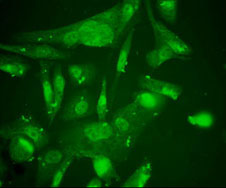| Posted: March 12, 2010 |
Nanotechnology-based drug-delivery research shows early promise |
|
(Nanowerk News) Northeastern University pharmaceutical sciences professor Mansoor Amiji is leading interdisciplinary research into nanotechnology-based methods of drug delivery that could provide breakthroughs in treating diseases such as cancer, Alzheimer’s, schizophrenia and HIV/AIDS.
|
|
The National Institutes of Health (NIH) recently awarded so-called R21 grants to back the work of Amiji and his collaborators from the Colleges of Arts and Sciences and Engineering. The NIH’s R21 program encourages novel and high-risk/high-reward research by providing support for the early and conceptual stages of project development.
|
 |
| Using nanotechnology, Amiji will work to deliver drugs inside cancer cells, like the Ovarian cancer cells pictured here. (Image: Mansoor Amiji.)
|
|
The National Cancer Institute awarded a two-year, $350,000 grant to develop more potent therapies for killing cancer cells that become resistant after initial chemotherapeutic treatment, which can cause relapse in patients with different types of cancer.
|
|
Amiji, working with chemistry and chemical biology professors Robert Hanson and Max Diem, will explore whether including the cell killer ceramide as a part of chemotherapy will kill tumor cells that are resistant to other treatment approaches.
|
|
Using nanocarrier technology, the combination treatment would be delivered directly to a cancer cell’s mitochondria to trigger cell death.
|
|
The National Institute of Neurological Diseases and Stroke awarded a two-year, $475,000 grant to Amiji and chemical engineering professor Rebecca Carrier to examine a “nano-emulsion” system of delivery that will allow drugs to cross the blood-brain barrier.
|
|
The process could greatly increase the recovery chances of a patient with Parkinson’s or HIV/AIDS, Amiji said, because “having a system to get these drug therapies to their appropriate place of action is critical.”
|
|
Current drugs developed for treating brain diseases can’t reach the brain 98 percent of the time because of the low permeability of the blood-brain barrier. Researchers are investigating whether a nano-sized mixture of water, oil droplets rich in omega-3 fatty acids and curcumin, an Indian spice, will help drugs cross the blood-brain barrier by increasing its permeability.
|
|
The new system could vastly improve the treatment of those diseases that tend to “hide” in the brain, using it as a sanctuary.
|
|
“If we can take the drug to where the virus is hiding, we will have better therapeutic effects,” said Amiji.
|

